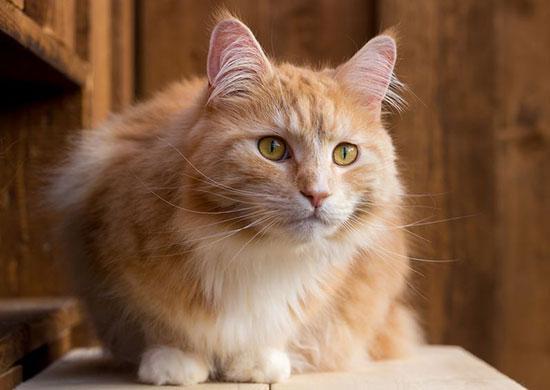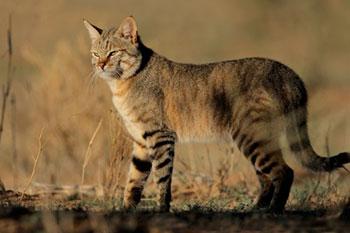This content is archived from the Feline Nutrition Foundation
Answers: Cat Urine Ph, Why It Matters
- Updated: Monday, May 13, 2019 03:11 PM
- Published: Saturday, February 01, 2014 07:39 PM
- Written by Guillermo Díaz. MV
 I hear a lot of talk about a cat's diet and how it affects urine pH levels. I'm getting very confused. I read that a cat's urine is naturally acidic and that some foods can cause alkaline urine, which is bad for a cat. Can you explain why the urine pH is important and what foods keep it the correct range?
I hear a lot of talk about a cat's diet and how it affects urine pH levels. I'm getting very confused. I read that a cat's urine is naturally acidic and that some foods can cause alkaline urine, which is bad for a cat. Can you explain why the urine pH is important and what foods keep it the correct range?
"Nature knows," reads an old saying. Everything she does has a purpose or an intention. When cats consume what nature intended for them, all of their internal organs stay healthy. When we as owners stray from nature and begin to feed kittens unhealthy and unbalanced diets, the problems begin. Cats have evolved and adapted to hunt, kill, eat and process meat. Through thousands of years of evolution, felids have developed unique characteristics of anatomy, physiology, metabolism and behavior indicative of obligate carnivores. They are animals that requires raw meat in their diet. True carnivores lack the metabolism required for the proper digestion of vegetable matter. It is important to bear in mind that there are no vegan cats.
Through evolution, cats have become dependent on the specific forms of nutrients found only in animal tissue, such as certain essential fatty acids and amino acids, minerals and vitamins, especially calcium, vitamin A and niacin. These nutrients are not found in plant tissue in forms that can be used by cats. Obligate carnivores require high levels of dietary animal protein and fat. Unlike other mammals, cats have evolved in such a way as to be "obliged" to use animal protein as their primary source of daily calories.
 The second evolutionary fact unique to domestic cats is that their ancestors were of desert origin. Because of this, many aspects of a cat's needs are different from other mammals. On a practical basis, because of their desert origin, felines have evolved to conserve water more efficiently than most mammals. This means that cats drink less water per day than a dog of similar size. This is probably the most important aspect – and the most overlooked by owners – of the feline urinary tract.
The second evolutionary fact unique to domestic cats is that their ancestors were of desert origin. Because of this, many aspects of a cat's needs are different from other mammals. On a practical basis, because of their desert origin, felines have evolved to conserve water more efficiently than most mammals. This means that cats drink less water per day than a dog of similar size. This is probably the most important aspect – and the most overlooked by owners – of the feline urinary tract.
When carnivores eat their natural diet of meat, organs and bones on a regular basis, their kidneys produce an acidic urine with a pH of around 6.0-6.5. Acidic urine is beneficial to them because it's difficult for bacteria to develop. This is the way nature protects the urinary tract of felines. Because of the high percentage of water in the natural diet, 75-80 percent, cats constantly eliminate through urination any crystals that form and prevent them from accumulating to form stones, which can lead to urinary blockage. Conversely, when carnivores are fed a diet to which they are not adapted, they tend to develop urinary problems. To what kind of foods are cats not adapted?
Answer: vegetables and grains such as rice, corn, wheat, soy and gluten meal. These are all sources of a lot of starch. When felines are fed a plant-based meal, their kidneys begin to produce alkaline urine with a pH greater than 7.0. This kind of urine is detrimental for the feline urinary tract because it is irritating to the mucosa of the bladder, altering its homeostasis and favoring bacterial growth and infection. In addition, if the cat does not ingest a great volume of water, the situation worsens. Dry kibble contributes to this lack of water going through the cat's system. All of these elements in the bladder and urethra – bacteria, crystals, blood, mucus – can get stuck. The only way to alleviate this crisis is by going to the emergency vet.
Some dry commercial kibble products have artificial acidifiers, such as dl-methionine, phosphoric acid or ammonium chloride, added in order to counteract the harmful effect of the plant-based elements. An artificially-acidified food can cause abnormally acidic urine, which could lead to the formation of calcium oxalate bladder stones.
Additional Reading
Adding Taurine to a Raw Cat Food Diet
To keep your cat's urinary tract healthy and maintain proper urinary pH, feed a diet close to what Mother Nature intended for felines. This means that a balanced, raw cat food diet is ideal as it doesn't contain plant-based foods and is high in moisture. Avoid diets with significant amounts of plant-based ingredients, especially low moisture, kibble-type dry foods.
Note: Feline Nutrition provides feline health and nutrition information as a public service. Diagnosis and treatment of specific conditions should always be in consultation with your own veterinarian. Feline Nutrition disclaims all warranties and liability related to the veterinary advice and information provided on this site.
Dr. Guillermo Díaz and family, including their four dogs (Leroy, Xica, Moza and Pepa) and six cats (Michalina, Tigger, Vladimir, Yellow, Mongo and Chirusa) moved to Buenos Aires, Argentina in July of 2017, where he expects to continue supporting different animal rescue groups, spread the benefits of raw food for cats and dogs and write articles about nutrition.




